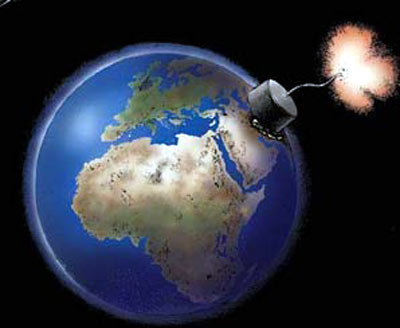
How, otherwise, could you make any sense of a world in which the United States declares it is threatened by Russian invasions of Ukraine; the Islamic State group takes over parts of Iraq and Syria, plus forms franchises in Libya, the Sinai peninsula and parts of South Asia; and even the "peaceful" Buddhists fight others in Myanmar and Sri Lanka?
(Mon Dieu! One thought the Buddhists at least could be trusted not to slaughter "others" in the name of inner serenity.)
But now the rumors of a new, terrifying world conflict seem as real to me as the barely believed rumors of a U.S. invasion of Iraq in 2002-'03.
In The Atlantic Times, published in Germany to reflect European attitudes toward Americans, a prominent American ambassador returned to Europe, tested the mood and wrote, "Was I now to witness the end of the peaceful era in Europe that I had seen begun in the Peaceful Revolution while a U.S. diplomat in East Germany?"
The piece by former Ambassador James D. Bindenagel was titled, with no lack of clarity, "Fears of War in Germany."
Other American journalists, The Wall Street Journal and many others, are backing into the looming conflict by warning of a "new Cold War." Yet, with all the Russian and Chechen troops taking over the borderland with Ukraine, this war is already more "hot" than "cold."
If you want to make any sense of the rumors -- and the surprising danger of an international war spreading from Ukraine to Islamic State adepts across the world -- you have to go back to the end of World War II.
Remember those heady days? World War I was to be the "war to end wars." When World War II ended, we still bathed in some of that idealistic thought. The boys had come home (including my beloved brother, who nearly died in the Battle of the Bulge) and a new world beckoned. In the Middle East, we barely noticed that the Ottoman Empire of Turkey had folded up in 1920, making homeless many of the young it had contained.
The poor societies of Africa, Asia and the Middle East had not gained by the war, and now they were poised for independence. Britain gave India and Pakistan independence; France, its colonies in Africa, the Caribbean and Asia (except for Algeria and Indochina); and Belgium and Italy went home from Africa. But this new freedom was far from the splendored thing imagined by the colonies' long-dominated subjects.
The former colonies now became known, with a derisive flourish, as the "Third World," after the First (the U.S. and its allies) and the Second (the U.S.S.R. and its allies). With no experience in governing themselves, most fell into bloody dictatorships. "Independence" was a Pandora's box.
Across this enormous post-colonial part of the world, human beings had now been doubly uprooted. First, when the colonialists destroyed the tribal and clan structures that had developed over centuries. Second, when "freed" of the colonialists, they found themselves with no systems of government and no faith or ideology to inspire them.
The next generations of young men became the desolate and desperate boys in the slums of the Third World.
I remember well a conversation with a particularly adept American ambassador in the Sultanate of Oman about 15 years ago. "Only 4 percent of the world's investment is going into the Middle East," he told me in Muscat, "but millions of boys are coming out of the Arab universities every year, and there is no place for them to go." It was an astute warning.
In the adjoining years from 1979 to 1989, the Soviets invaded and occupied Afghanistan. But the United States successfully armed the mujahedeen. Unfortunately, when the Russians left, the U.S. left, too, leaving still another group to fuel the Islamic State.
The Soviet Union and its ideological world empire collapsed formally in 1991. We rejoiced prematurely, because now there were more young men and women across the world without faith and without purpose.
Kindly note that the countries that are NOT threatened by either disintegration or massacring Islamism are Oman and the Gulf states, Morocco, Jordan and a few others, all of which have successful monarchies. In effect, their leaders go back to the Prophet Muhammad and thus have unquestioned legitimacy. In Africa, one of the few nations not formally colonized, Botswana, whose intact tribal structures work well, also has historic legitimacy.
Meanwhile, our beloved country was denying the great victories of World War II by fighting adventurous and illegitimate wars in Vietnam, and then Iraq and Afghanistan. Now we are about to fight again against the Islamic State, which we actually created in this "new world," first by abandoning the Afghan mujahedeen and second by abandoning the Iraqi army when we occupied Iraq.
That, in too fast a narrative, is how I see the roots of the conflicts we face today. The most important thing, as always, is to understand where we've been. Then we can figure out where to go.
Previously:
• 01/21/15: It's time to be practical about multiculturalism
• 01/07/15: Tension mounts against Muslim immigration in the West
Comment by clicking here.
Georgie Anne Geyer has been a foreign correspondent and commentator on international affairs for more than 40 years.



 Contact The Editor
Contact The Editor
 Articles By This Author
Articles By This Author